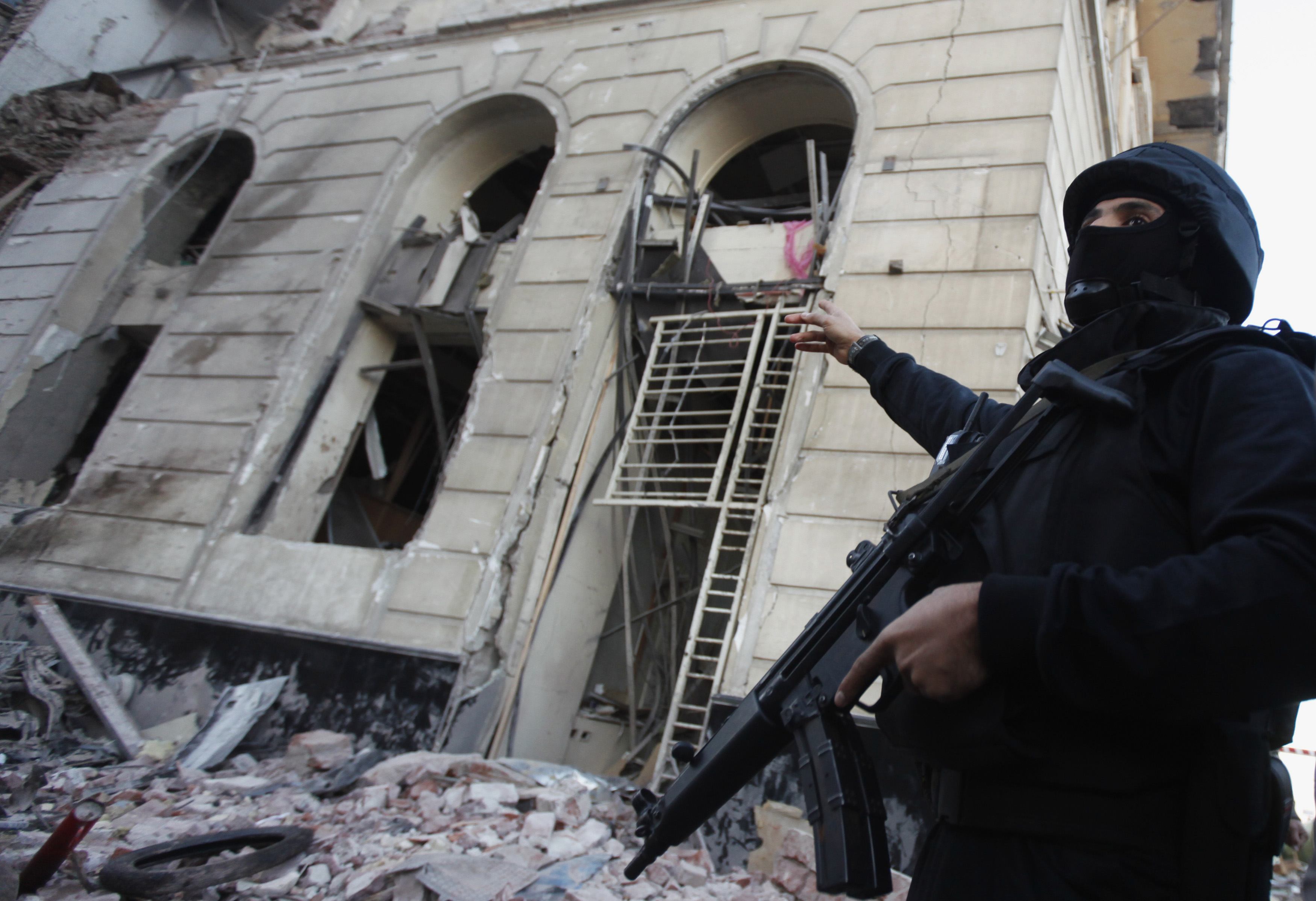Latest NEWS
- Aswat Masriya, the last word
- Roundup of Egypt's press headlines on March 15, 2017
- Roundup of Egypt's press headlines on March 14, 2017
- Former Egyptian President Hosni Mubarak to be released: lawyer
- Roundup of Egypt's press headlines on March 13, 2017
- Egypt's capital set to grow by half a million in 2017
- Egypt's wheat reserves to double with start of harvest -supply min
- Roundup of Egypt's press headlines on March 12, 2017
Two police officers killed in bomb blasts near Cairo palace

A riot police officer gestures outside the building of the Directorate of Security after an explosion in the Egyptian Nile Delta town of Dakahlyia, about 120 km (75 miles) northeast of Cairo December 24, 2013. REUTERS/Mohamed Abd El Ghany
By Maggie Fick
CAIRO, June 30 (Reuters) - Two Egyptian police officers were killed on Monday while trying to defuse makeshift bombs planted near Cairo's presidential palace by Islamist militants close to the anniversary of the army's overthrow of an elected Islamist president.
Radical Islamists have repeatedly attacked police and soldiers with bombings and shootings since the ousting of President Mohamed Mursi, a member of the Muslim Brotherhood. The Brotherhood denies any link to the violence.
The militant group Ajnad Misr, or Soldiers of Egypt, said it had planted several bombs near the presidential palace to target security forces before realising that civilians could be in danger. It later released a statement saying it had been unable to remove the devices and urging passersby to be cautious.
"There are two explosive devices ... at the corner of the palace at the intersection of al-Ahram and al-Merghani streets", read the statement that appeared on its Twitter account.
One police officers were killed as security forces tried to deactivate a bomb found at that location, and a second officer was killed during a similar operation in a nearby street, the interior ministry said in a statement.
Monday was the first anniversary of mass street protests against Mursi's rule that brought about his removal by the armed forces on July 3. The then-army chief, Abdel Fattah al-Sisi, was elected president in May.
Thousands of Brotherhood leaders including Mursi and supporters have since been arrested, scores sentenced to death and hundreds more have been killed in a security crackdown on Egypt's oldest Islamist movement.
Eight people were hurt in a series of explosions last week on Cairo's metro, the first attacks in the capital since Sisi was sworn in as president.
"WAR AGAINST TERRORISM"
The security dragnet has since been expanded to include secular and liberal activists, including many who played leading roles in the 2011 popular revolt that ousted autocratic President Hosni Mubarak.
The right to protest has been sharply restricted by a law passed after Mursi's fall last year. Around 23 activists were arrested at the weekend over a rally in Cairo against the law.
Western governments and rights groups have voiced concern for freedom of expression in Egypt. The security clampdown has dimmed hopes for democratic evolution in Egypt that had soared after the anti-Mubarak uprising three years ago.
The jailing last week of three Al Jazeera journalists for seven years on charges of assisting banned Islamists caused an international outcry. Cairo rejected the condemnations as interference.
For the United States, concern over rights issues are balanced by the importance of Egypt as a strategic partner in the Middle East.
Sisi, who resigned from his post as army chief in order to run for president, has urged the United States to provide military equipment toEgypt in its campaign against militants.
U.S. Secretary of State John Kerry said during a visit to Cairo earlier this month that Egypt would be given aid in the form of Apache helicopters to use against militants active in the Sinai Peninsula that borders Israel. (Editing by Lin Noueihed and Mark Heinrich)










